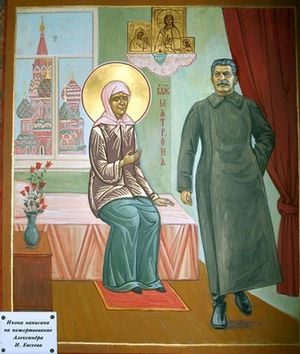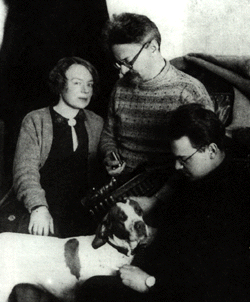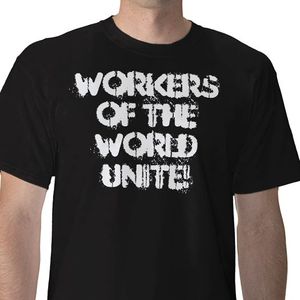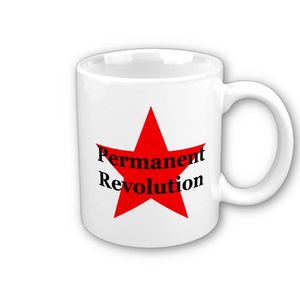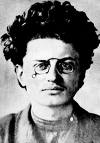Trotskyism
Trotskyism is the theory of Marxism as advocated by Leon Trotsky. [1] Trotsky considered himself an ‘orthodox Marxist’ [2] and Bolshevik-Leninist, arguing for the establishment of a vanguard party. [3] It was a ‘vanguard’ because, although it represented the working class, it was far cleverer than the millions of working class, even though such a ‘vanguard’ was only made up of Lenin/Trotsky and a few of his mates.
Introduction: Marx, Trotsky and Stalin[edit | edit source]
Trotsky’s politics ‘differed sharply from Stalinism. Or, more correctly, this is what Trotskyists tell us. The main difference between Trotsky and Stalin, of course, is that Stalin gained control of a huge state. Trotsky didn’t. So in that sense Trotsky couldn’t have failed to be different to Stalin. Critics have argued, however, that if Trotsky had gained power instead of Stalin, he would have become like Stalin. Inversely, if Stalin hadn’t gained power like Trotsky, he would have ended up like Trotsky. But there was one vital difference. Trotsky had one hell of a goatee beard whereas Stalin had one hell of a tash. Despite the profound difference between tash and beard, Trotskyists tell us that the ‘real and important’ difference was Trotsky’s opposition to ‘socialism in one country’.
Some have argued that because Trotsky didn’t gain power in that ‘one country’ – Russia, that this was the (real) reason why he was keen to see socialism in more-than-one country (perhaps two or three). What mattered was that Trotsky could be in charge in one of these non-Russian countries. In any case, because Russia was so damn big, Stalin wasn’t that keen on ruling more than one country. It seems that Trotsky, or the ‘vanguard of the working class’ (to give Trotsky his other name), did want power in more than one country. That’s why he gained power in no country.
The official reason for this (that is, the Trotskyist reason), was that Trotsky believed that socialism in one country would break with proletarian internationalism. And, as we all know, most ‘members’ of the working class are very internationalist in nature (especially football fans). The idea was meant to be that if the working class took over in, say, Luxembourg, then that would inspire the working class in Belgium to do the same (just as when Islamists take over a country, Islam is meant to spread to other countries - this didn’t work in the Israel-Palestine case).
What is Trotskyism?[edit | edit source]
James P. Cannon, in his 1942 book History of American Trotskyism, wrote that
| “ | Trotskyism is not a new movement, a new doctrine, but the restoration, the revival of genuine Marxism as it was expounded and practiced in the Russian revolution and in the early days of the Communist International’. | ” |
This is very similar to the claims that Martin Luther made about Christianity. That is, that Lutheranism
| “ | ..was not a new movement, a new doctrine, but the restoration, the revival of genuine Christianity as it was expounded and practiced in the time of Christ, and just after, and in the early days of the Christian Church. | ” |
Any other similarities between Trotskyism or Marxism and religion are, I’m sure, purely coincidental. That is, apart from the very many similarities which are not coincidental. Despite Trotsky, or Trotskyism, being true and faithful to Lord Marx, it can be distinguished from other Marxist theories (if only by those nerds who are obsessed by such things - such as rival Trotskyist groups) by four key elements:
- Support for the strategy of permanent revolution, in opposition to the Two Stage Theory of his opponents. [4]
- Criticism of the post-1924 leadership of the Soviet Union (because Trotsky was no longer part of the scene then). An analysis of its features (the main ‘feature’being that Trotsky was no longer on the scene then). Support for political revolution in the Soviet Union, after 1933, in the vital sense of bringing Trotsky and the Trotskyists to power.
- Support for social revolution (i.e., social as in ‘socialist’and ‘socialist’ as in ‘Trotskyist’) in the advanced countries through working class mass action – that it, mass action directed by around ten to twenty Trotskyites.
- Support for proletarian internationalism. This means that what must be ‘truly international’ is the doctrine of Trotskyism and the power of the Trotskyists.
On the political spectrum of Marxism, Trotskyists are considered to be on the left. However, Trots have often been called ‘red fascists’ by not only the right, but the left as well. This is unfair because the only thing they share with fascists is everything other than racism (except towards the Jews), the colour red and goatee beards. They supported democratic rights in the USSR because that was the only way they could gain power in that country. Once the ‘workers state’, or Trotsky Land, was established, however, ‘the people simply wouldn’t need democracy any more because class conflict and hatred, and all other bad things in life, would have been eradicated’. But Trotskyists, as they often said, were not ‘Utopians’ (because Utopians were usually not Trotskyists). Utopians, Trotskyists argued, could never actually bring about Utopia. Trotskyists, on the other hand, could bring about Utopia (though they would not call it by that rather-embarrassing name).
The Theory of Permanent Revolution[edit | edit source]
In 1905, Trotsky formulated a theory that became known as the Theory of Permanent Revolution. [5]
The theory of permanent erection…sorry, revolution, may be considered one of the defining characteristics of Trotskyism (apart from the having of goatee beards and John Lennon glasses). Until 1905, Marxists had only shown how a revolution in a European capitalist society could lead to a socialist one. But this excluded countries such as Russia. And it was considered unfair, and ‘anti-Slav’, to rule Russia out of the fun and games that is violent revolution just because it was full of peasants and a few Nobs with extremely large mustashes.
Russia, in 1905, was widely considered, by most Marxists at the time, to have not yet established a capitalist society, but was instead largely feudal with a small, weak and almost powerless capitalist class. What gave this away to the Marxists was the fact that there were at least twenty times more cows that workers, fifty times more wooden huts than factories, and a capitalist class that amounted to about twenty people (most of whom were related to Lenin and Trotsky, but not to Stalin). The Theory of Permanent Revolution addressed the question of how such feudal regimes were to be overthrown, and how socialism could be established given the lack of economic prerequisites.
But given the edict that Marxism must never been tampered with, on pain of apostasy, this proved a little tricky for the Marxists who were now Trotskyists. If the peasantry amounted to 200 million or more, and the workers to about ten (ten, not ten million), then a workers’ revolution was bound to be a little unfair on the peasantry, especially if the working class was led by an even smaller group of people who were actually middle - or upper-middle - class. This, for some reason, didn’t seem fair on the peasantry. What did they know? Well, not much really. What did the ten workers know? Not much really, but a little bit more than the peasantry. And what did the ‘vanguard of the working class’ know? Well, just about everything (at least according to the vanguard of the working class).
Trotsky argued that in Russia only the working class could overthrow feudalism and win the support of the peasantry, but that the working class would not stop there. ‘Superficially’ it may seem odd that the peasantry would wholeheartedly want the overthrow of feudalism considering the fact that they were, well, peasants or farmers. So although the rich Nobs ruled them with a rod of iron, siding with workers from factories which they had never even seen, and siding with the vanguard of the working class which seemed remarkably similar to the feudal nobility they already despised, things didn’t look that promising.
Despite the immense negative odds (which have never stopped revolutionary socialists), the working class… well, the vanguard of the working class (with the muscle, fists and guns of the working class) would seize the moment to go on to win its own revolution against the weak capitalist class, establishing a workers' state, and appeal to the working class in the advanced capitalist countries to come to its aid, so that socialism could develop in Russia and worldwide… As simple as that really. The fact that the country was overwhelmingly a peasant society with a few rich Nobs on top, didn’t stop the revolutionaries going right ahead with the revolution (or attempting to do so). Some said that it was precisely because the country was pretty backwards, ‘reactionary’, deeply religious and full of peasants, that this was bound to lead to Stalin’s dictatorship later. How else could Stalin have squared so many circles? Only by brute force and a hell of a lot of charm (which he was noted for). However, Leninists and Trotskyists argued that the advent of Stalinism was not inevitable all. If only that very good man Lenin had not overdosed on crack. And if only that even better man, Trotsky, had not had his arse kicked by the evil Stalinists, everything would have gone just dandy. All that was required to turn a feudal society into a workers’ state was the correct reading of Marx, Lenin and then, of course, Trotsky. The fact that Lenin the Good himself was said to have also displayed distinctly Stalinist traits (or did Stalin display Leninist traits?) is said to be a ‘complete falsehood’ – by Leninists (strangely enough). Leninists have said that such negative appraisals of Lenin are only made by those people who didn’t like him or what he stood for. Like Muhammad before him, the Truth is that Lenin’s character was utterly flawless. He would have been a saint had he believed in God and stuff. [6]
The ‘Bourgeois-Democratic Revolution’[edit | edit source]

Trotsky wrote:
| “ | However much one may compare the Russian Revolution with the Great French Revolution, the former can never be transformed into a repetition of the latter. | ” |
In the French Revolution of 1789, France experienced what Marxists called a ‘bourgeois-democratic revolution’ – a regime was established where the ‘bourgeoisie’ (the French term approximating to ‘capitalists’), overthrew feudalism. Don’t let the various technical terms and ‘isms’ fool you. Because if they do, you won’t stand a chance of understanding Marxism and Trotskyism. These theories are built on various ‘ists’and ‘isms’. They feed off them. [8]
So the French Revolution was a ‘bourgeois-democratic-revolution’ (note the clever double adjective). And don’t forget that it is a fact that the French Revolution was a bourgeois-democratic-revolution. The French Revolutionaries at the time didn’t know this. In fact, most people still don’t know this. In case you haven’t realised, everything Marxists and Trotskyists say is factual. Not only that, but also ‘scientific’.
Origins of the Term ‘Permanent Revolution’[edit | edit source]
An internationalist outlook of permanent revolution is found in the works of Karl Marx. The term ‘permanent revolution’ is taken from a remark of Marx from his March 1850 Address: ‘It is our task’. It was important to Trotskyists that the term - and idea of - ‘permanent revolution’ could be found in Marx because if they couldn’t find it there, then they couldn’t class themselves as ‘Marxists’.
Also, to invent a term - or to believe a theory - that is not bone fide Marx would have been like Martin Luther adding post-modern ideas to Christianity or the Pope bringing in a bit of structuralist semiotics into Catholic creeds. Just as Christian Biblical scholars scour the landscape of the Bible in order to rationalise what it is they would believe anyway, so Trotskyists put the microscope to Marx in order to justify what they believe anyway.
Trotskyism and the 1917 Russian Revolution[edit | edit source]
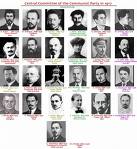
Trotsky's followers maintain that, together with Lenin, Trotsky ‘was the most important leader of the Russian Revolution and the international Communist movement in 1917 and the following years’. Unfortunately, Stalin was said, by Trotskyists, to have erased all the photos of Trotsky kicking capitalist arse and inflaming the working class. Stalin’s supporters, strangely enough, said that ‘Stalin was the most important leader of the Russian Revolution’. [10] So who knows? Who cares? It was nearly 100 years ago anyway! But that doesn’t stop far-leftist nerds endlessly debating things like: ‘Was it October the 4th or October the 5th that the real Revolution started?’ Or: ‘Was it Lenin or Trotsky who wrote the second line of the vital pamphlet, ‘Let’s Kick Capitalist Arse?’
The Dictatorship of the Proletariat[edit | edit source]

Part of the ‘international revolution’ idea was the thought that socialists must have ‘unwavering support’ for a ‘true dictatorship of the proletariat based on democratic principles’. This writer, and just about everyone else who is not a Trotskyist, have found it very difficult to understand this juxtaposition of ‘dictatorship’ and ‘the whole working class’, as well as the juxtaposition of ‘dictatorship’ and ‘democratic principles’. That is because we are all pretty thick. Despite the strange, almost dialethic, logic used, only the vanguard [12], could truly understand its inner logic, just as Islamic scholars are the only ones who truly understand the Koran. [13]
Trotskyist movements[edit | edit source]
Numerous groups around the world continue to see - but not always describe - themselves as ‘Trotskyist’, including Respect, Hitz ut-Tahrir, the Guardian and the Party For the Mass Extermination of All Capitalists and Zionists. However, it is often the case that ‘true’ Trotskyists don’t actually call themselves ‘Trotskyists’. This complicates things a lot. They call themselves things like ‘The Anti-Fascist League’ or ‘Searchlight’ or ‘the Stop the War Coalition’. Some of these groups, they say, have ‘developed’ Trotsky’s ideas in different ways. And it is because of this that, for example, the Socialist Workers Party and Workers Power have called them ‘sacrilegious’, ‘reformists’, ‘gradualists’, ‘wankers’, ‘apostates’ and the rest.

It is said that Trotskyist groups ‘do not support communist genocide’. They support "Trotskyist genocide" instead – which is a better, more classy, kinda genocide. Unhappily, unlike Stalinists and Soviet Communists, Trotskyists haven’t had the chance to commit mass genocide or any other kind of genocide. That might be because they have never achieved power in any country. However, because Trotskyists are ‘internationalists’, it can only be the case that international genocide (of capitalists, Greens, etc) would be far better than genocide in one country.
Trotskyism Today[edit | edit source]
There is a wide range of Trotskyist organisations around the world. These include, but are not limited to, the following:
The Fourth International[edit | edit source]
The Fourth International derives from the 1963 reunification of the two public factions into which Fourth International split in 1953: the International Secretariat of the Fourth International (ISFI) and the ICFI. But who gives a fuck about all this political minutia? Oh, yes, Trotskyists and other nerdish far leftists do.
Anyway. Every single sentence you will ever read about Trotskyist parties and movements will contain the word ‘faction’. This means that a lot of Trotskyist groups fight for – and desire – power. So they create niggling little esoteric differences between one another in order to sell themselves to the gullible. Thus the Workers Revolutionary Party squabbled with the Revolutionary Workers Party which, in turn, squabbled with the Party of Revolutionary Workers about ‘who had the biggest cock – was it Lenin or was it Trotsky?’.
In many countries, the Fourth International’s sections worked within working-class parties, and alliances, in which Trotskyists are a minority. This may have something to do with the fact that the vast majority of Trotskyists were and are class. Sorry, that’s not quote true. Many are aristocratic (Alex Callinicos, of today’s Socialist Workers Party, is such a case). There are a couple of working class Trotskyists, such as John ‘I’m working class’ Rees and Chris ‘from a working-class background’ Harman in the SWP.
Committee for a Workers' International[edit | edit source]
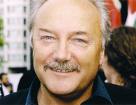
The Committee for a Workers’ International (CWI) was founded in 1974 and now has sections in over 35 countries. Before 1997, most organisations affiliated to the CWI sought to build an entrist Marxist wing within the large social democratic parties. The problem with social democratic parties, they thought, was that they didn’t want the lives of the working class to get shittier in order to ‘radicalise’ them; unlike Trotskyists who simply love the latest ‘capitalist crisis’ or rise in unemployment figures – just as flies love shit.
So since the early 1990s the CWI has argued that most social democratic parties have moved so far to the right that there is little point trying to work within them. [16] Instead, the CWI has adopted a range of tactics, mostly seeking to build independent parties, but in some cases working within other broad working-class parties. All this despite thinking that the working class is thick… sorry, ‘brainwashed’ or consumed by ‘false consciousness’ – all due to that Platonic entity Trotskyists call ‘the Media’. [17] ‘True consciousness’ is, of course, ‘Trotskyist consciousness’. This means that all you require to be ‘politically sophisticated’ is to read and memorise, say, Socialist Worker everyday and then recite it to anyone who has the patience not to punch you right in the face (straight away).
International Socialist Tendency[edit | edit source]

The International Socialist Tendency, led by the Socialist Workers Party, the largest Trotskyist group in Britain (SWP). It has at least 1010 members, which is ten more than the SWP on its own. As for that strange word ‘tendency’. This means that students have a tendency to join the Trotskyist SWP. Trotskyists have a tendency to patronise the working class, just as their fathers, grandfathers and great-grandfathers did (though without the crutch of Trotskyism).
The Tendency to Fiddle With Sheep Party[edit | edit source]
Its main policies are the legalisation of sheep fiddling and free camping trips to rural Wales.
Footnotes[edit | edit source]
- ↑ This advocacy is not to be confused with the Martin Luther’s advocacy of Jesus and the Christian Church, to which it is very similar.
- ↑ Not to be confused with ‘orthodox Jew’, to which it is very similar.
- ↑ The vanguard party would be Lenin and a few of his best mates or Trotsky and a few of his best mates.
- ↑ Trotsky said that the ‘revolution must remain permanent, even if it is boring you shitless’.
- ↑ This is not to be confused with the common symptom which teenage males suffer from, ‘the permanent erection’ – though those who like their revolutions permanent, according to Freudian-type people, often do so because they cannot get an erection.
- ↑ This didn’t stop future Leninists and Trotskyists from the retrospective beatification and then full canonisation of Lenin.
- ↑ Trotsky claimed that Marx 'didn't look at all like Moses'.
- ↑ For example, have you heard about the Trotskyist Theory of the Before Breakfastists or the Theory of Motorway Stopping-Points?
- ↑ Unless you include the Bolshevik tea ladies and the 'groupies for Lenin'.
- ↑ Jeffrey Archer and Alan Bast’rd MP have also claimed to have brought about the Russian Revolution.
- ↑ Trotskyists say that comedy is 'counter-revolutionary' and bound to 'slow the revolution down'.
- ↑ Full of clever members of the middle class who ‘simply adored the working class’.
- ↑ Personally, I just couldn’t be bothered finding out the truth of the matter. I have better things to do. As is the case with everyone else outside the Trotskyist movement.
- ↑ I'll get back to you on that one.
- ↑ Which can only be a good thing.
- ↑ Being ‘so far to the right’means ‘not Trotskyist’ or ‘they don’t want to build Gulags for capitalist scum’.
- ↑ Trotskyist parties, of course, never ever brainwash anyone.
- ↑ Darling stopped being a Trot when he gained power, as did the others.



